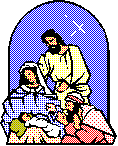 Much debate has
been centered around the meaning of the Hebrew word almah,
translated "virgin" above. Does it in fact mean
"virgin" or just a young, unmarried woman? A couple of
points need to be made in this regard.
Much debate has
been centered around the meaning of the Hebrew word almah,
translated "virgin" above. Does it in fact mean
"virgin" or just a young, unmarried woman? A couple of
points need to be made in this regard.
Books and eBooks by the Director
"Born of the Virgin Mary"
The Apostle's Creed declares Jesus was "born of the Virgin Mary." But what is the Biblical evidence for this statement? And why was this affirmation considered so important as to be included in this ancient document of the Christian Church?
Biblical Evidence for the Virgin Birth
Gen 3:15: And I will put enmity between you and the woman, And between your seed and HER SEED; He shall bruise your head, And you shall bruise His heel.
Here is the first promise of a coming Redeemer. God promises the Seed of the WOMAN will defeat the serpent (Satan). This is the only passage in the Old Testament where there is a reference to the "seed" of a woman. Elsewhere, it is always worded as referring to the seed of a man (see Gen 21:12,13; 22:18; 26:4; 28:14; Dan 2:43).
Isa 7:14: Therefore the LORD Himself will give you a sign: Behold, THE VIRGIN shall conceive and bear a Son, and shall call His name Immanuel.
 Much debate has
been centered around the meaning of the Hebrew word almah,
translated "virgin" above. Does it in fact mean
"virgin" or just a young, unmarried woman? A couple of
points need to be made in this regard.
Much debate has
been centered around the meaning of the Hebrew word almah,
translated "virgin" above. Does it in fact mean
"virgin" or just a young, unmarried woman? A couple of
points need to be made in this regard.
First, "There is no instance where it can be proven that almah designates a young woman who was not a virgin" (Harris, p.672). The other passages in which the word occurs are: Gen 24:43 (compare. v.16); Exod 2:8; Ps 68:25; Prov 30:19; Song 1:3; 6:8.
Second, the Septuagint (a second century B.C. Greek translation of the OT) translates almah in this verse by parthenos. This is the Greek word for virgin.
Third, the LORD is declaring He is giving a "sign" to Israel. There is no sign in a woman conceiving in the normal manner. But for a virgin to conceive ....
Matt 1:2-16: Abraham begot Isaac, Isaac begot Jacob, and Jacob begot Judah and his brothers. Judah begot Perez and Zerah by Tamar, Perez begot Hezron, and Hezron begot Ram. Ram begot Amminadab, Amminadab begot Nahshon. . . .
This exciting reading continues through verse 15. Verse 16 then reads, "And Jacob begot Joseph, and Joseph begot Jesus" - whoops! It doesn't really say this.
Verse 16 actually reads, "And Jacob begot Joseph the husband of Mary, of whom was born Jesus who is called Christ." Why the switch at this point? - Because Jesus was not "begot" by Joseph. Joseph was Jesus' STEP-father, not His biological father.
Moreover, "of whom" is feminine in the Greek. If Joseph was involved in the conception of Jesus, correct Greek grammar would have demanded a masculine pronoun.
Matt 1:18-25: "Now the birth of Jesus Christ was as follows: After his mother Mary was betrothed to Joseph, before they came together [had sexual intercourse], she was found with child of the Holy Spirit" (1:18).
With this sentence, Matthew eliminates any male, human parentage for Jesus. His conception was "of the Holy Spirit." But imagine Mary attempting to explain this to her fiancee': "Joseph, I'm pregnant - but I'm still a virgin. Really!"
Needless to say, Joseph didn't believe her. Under Jewish Law, he could have had her executed for sexual infidelity (Deut 22:22-24). However, Matthew writes, "Then Joseph her husband, being a just man, and not wanting to make her a public example, was minded to put her away [divorce her] secretly" (1:19).
But sometime thereafter he married her. Something must have happened convincing him Mary had not been unfaithful. This "something" was the appearance of an angel. Joseph was told, "that which is conceived in her is of the Holy Spirit" (1:20).
Lastly, Matthew quotes Isaiah 7:14 and follows the Septuagint in rendering almah as parthenos. This confirms "virgin" is the correct translation of almah.
Luke 1:26-38: "Now in the sixth month the angel Gabriel was sent by God to a city of Galilee named Nazareth, to A VIRGIN betrothed to a man named Joseph, of the house of David. The virgin's name was Mary."
 After this introduction in verses 26 and 27, Luke
records the announcement of the angel to Mary, "Behold, you
will conceive in your womb and bring forth a Son" (1:31).
Mary's response was to ask, "How can this be, since I do not
know a man [am a virgin]?"
After this introduction in verses 26 and 27, Luke
records the announcement of the angel to Mary, "Behold, you
will conceive in your womb and bring forth a Son" (1:31).
Mary's response was to ask, "How can this be, since I do not
know a man [am a virgin]?"
The angel responds to Mary's inquiry, "The Holy Spirit will come upon you, and the power of the Highest will overshadow you; therefore, also, the Holy One who is to be born will be called the Son of God" (1:35). So Luke confirms Matthew's claim Jesus was born of the virgin Mary and "of the Holy Spirit."
John 8:41: "Then they said to Him, "'We were not born of fornication.'"
Here, the Pharisees are hinting to Jesus that His birth was illegitimate. Since Jesus was born less than nine months after Mary and Joseph were actually married (Luke 1:56; 2:4-7), many rumors were probably floating around. So this verse provides incidental evidence there was uncertainty surrounding Jesus' conception.
The Importance of the Virgin Birth
So there is ample explicit and implicit evidence in the Scriptures to uphold the affirmation of the Apostle Creed that Jesus was, "born of the Virgin Mary." But why was this considered vital enough to be to be included in this short document?
The main answer to this question concerns Jesus' atonement for our sins. Three things would be required for His sacrifice to be efficacious. First, Jesus would have to be sinless (2Cor 5:21; Heb 7:26-28).
Second, He would have to be God. Only an infinite sacrifice could atone for all of the sins of all of the children of God (John 1:29; 11:49-52; Rev 7:9-14).
Third, in addition to being fully God, Jesus would also have to be fully human. Only in this way could He stand in our place as a sacrifice for our sins and be our Mediator before God the Father (Job 9:32,33; Heb 2:14-17; 4:14-16; 1Tim 2:5).
The Virgin Birth provided the means by which all three of
these criteria could be met. First, original sin is passed on
through the normal conception process (Ps 51:5; Rom 5:12). The
Virgin Birth enable Jesus to avoid this curse of the Fall.
Second, two human beings could not have conceived God. But the Virgin Birth enabled God the Holy Spirit to be involved in the conception of Jesus.
Lastly, the involvement of Mary provided Jesus with His human nature. So with the Virgin Birth, Jesus could be fully God and fully human (John 1:1,14; Phil 2:5-8).
So the Virgin Birth opened the way for sins to be atoned for. Hence why this affirmation was included in the Apostle's Creed and why the angel declared to Mary:
"YOU
SHALL CALL HIS NAME JESUS,
FOR HE WILL SAVE HIS PEOPLE FROM THEIR SINS"
(Matt 1:21).
Books and eBooks by Gary F. Zeolla, the Director of Darkness to Light
Bibliography: All Scripture references
from: New King James Version. Nashville, TN: Thomas
Nelson Publishers, 1982, unless otherwise indicated.
Harris, Laird et.al. Theological Wordbook of the OT.
Vol. II. Chicago: Moody Press, 1980.
For a response to the above article, see Isaiah 7:14 and Almah.
"Born of the Virgin Mary." Copyright © 1999 By Gary F. Zeolla of Darkness to Light ministry (www.zeolla.org/christian).
The above article originally appeared in Darkness to Light
newsletter in 1994.
It was posted on this website in July 1996.
![]() Text
Search
Text
Search ![]() Alphabetical
List of Pages
Alphabetical
List of Pages ![]() Subject
Index
Subject
Index
![]() General Information on Articles
General Information on Articles
![]() Contact Information
Contact Information
Darkness
to Light Home Page
www.zeolla.org/christian